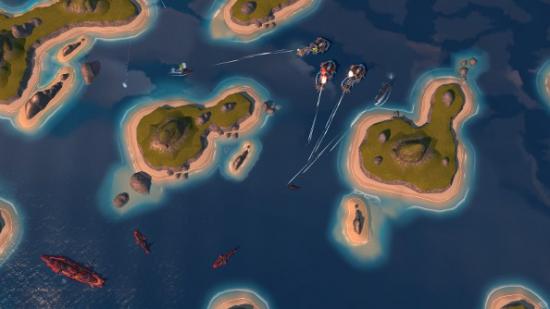The entire time I was at the Paradox Con in Iceland, I had to keep checking my invitation to make sure I was at the right event. It just didn’t look like the Paradox I remembered from two years ago in New York. I couldn’t find those quixotic projects made with enthusiasm in inverse proportion to professionalism. There were none of those disastrous presentations where the developer is monologuing about awesome features that you just know, beyond any doubt, are anything but awesome.
More than anything else, the four-day event showcased Paradox’s maturation as a publisher, and the balance they have struck between sensible management with a lineup that remains is still a long distance from the mainstream. It was evident in the sheer number of good-looking games on display, and a strong core of developers who seemed to know how to make them even better.
Run out the guns
If I had to pick one game to typify what I’m starting to think of as New Paradox, it would be Leviathan: Warships, a steampunk battleship combat game from Pieces Interactive. It’s multiplatform for PCs, Macs, Android, and iOS, with cross-platform multiplayer. Think Frozen Synapse with dreadnoughts: players sketch out their movement and actions in advance, and then all those actions are resolved simultaneously during a 10-second turn.
What I like most about Leviathan is just how simple and focused it is. It’s about one thing, fleet-sized deathmatches at sea, and its interface and controls remove all the obstacles to enjoying that. The artwork is distinctive enough that you can easily identify different ship types and loadouts, ship customization seems straightforward and rewarding.
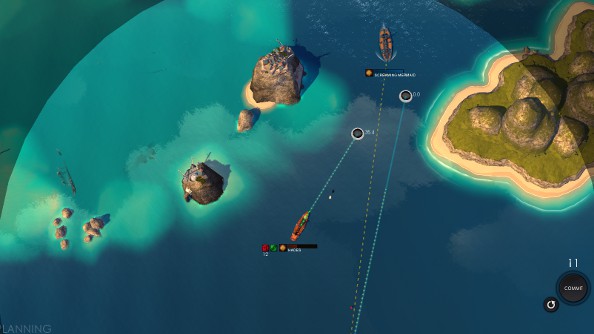
It’s also got just enough tactical depth to keep me interested. Naval warfare can easily become monotonous, because fleets usually end up moving in parallel and exchanging body blows. Leviathan’s maps, however, are littered with islands, shallows, and sandbars that complicate matters. A destroyer might be able to dash through some shallow water to close into engagement range, but it’s hulking battleship brother will run aground if it tries to follow.
Furthermore, the biggest ships have extraordinary range and firepower, but they need scouts and escorts to provide visibility and up-close protection. Some weapons can even be blind-fired, like rockets, so if you suspect an enemy fleet of lying in wait on the other side of a strait, you can fire a few rounds over there just to give them something to think about.
Leviathan wasn’t necessarily my favorite game at Paradox Con, but it was the one I’m most confident in. It seems poised to perfectly deliver on some sharply-focused ambitions, and the emphasis on multiplayer should keep it fresh for a long time.
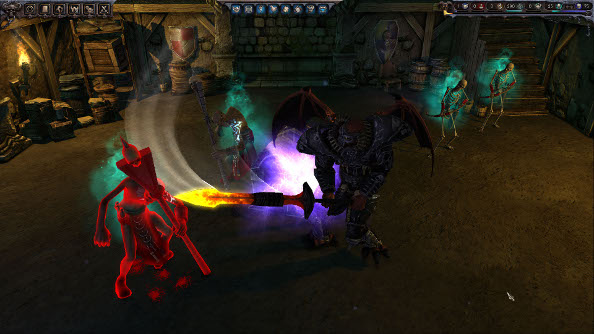
Imperative decisions
The gang at Cyanide Montreal want you to know that while they are a subsidiary of Cyanide (Blood Bowl, A Game of Thrones: Genesis), they are a completely different studio from the famously inconsistent and unreliable French developer. Not that there’s anything wrong with Cyanide! But, you know, Cyanide Montreal just wants to make sure you understand that they have their own identity, and have nothing to do with any negative Cyanide experiences you may have had.
Having spent an hour or so with Impire, I’m inclined to give them the benefit of the doubt. All the tutorial scripting worked well (and even foiled my attempts to sabotage it), and not once was I punted to a desktop or a blue screen. More importantly, Impire also seemed on track to be a best-of-both-worlds combination of RTS and dungeon management.
Ideally, Impire is about balance and escalation. On the one hand your are expanding and managing a growing dungeon with its own foul economy and a menagerie of monsters and thralls. You also have to defend it from invading bands of heroes, who become more deadly as your dungeon grows larger and more notorious. Combat yields experience to the monsters who survive it, which is valuable when it comes time to send them to the overworld on raids for special loot. But while those units are out pillaging, they’re not available to defend the dungeon.
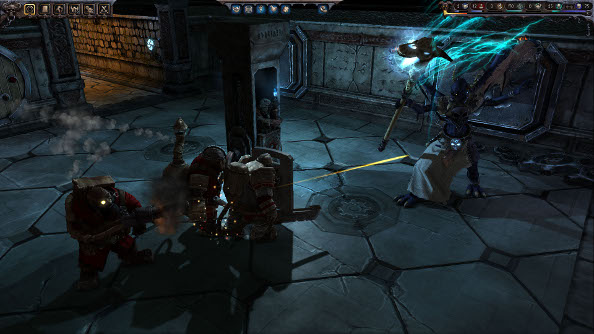
The final twist is that you’re not the only dungeon manager in play. There are other dungeons and lords on the battlefield who are doing the same thing you’re doing, and eventually you’ll come into competition as you tunnel your way toward key locations and start mining into each other’s dungeons. So eventually, Impire is about defending against heroes, raiding for loot, building up your dungeon, and battling other players all at once. And the better you do, the more threats start showing up on your doorstep.
It sounds like a neat tug-of-war, with different goals in tension with one another. I didn’t get far enough in my session to know whether it all holds together, but I did see flashes of the multi-dimensional strategy game Impire promises to be. If Cyanide Montreal and Paradox deliver on their goals, Impire looks like it will be a welcome addition to the dungeon management genre, and a combination of the competence prized by modern Paradox and the quirkiness that defined it a few years ago.
Cold warmongering
Speaking of accessibility, East vs. West, a follow-on to Hearts of Iron 3 that covers the entirety of the Cold War, was probably my biggest worry heading into Paradox Con. It has the potential to be “Classic” Paradox: obscure and overpopulated with systems and statistics, forced into a setting that doesn’t lend itself to great strategy. Bipolar international relations rarely make for exciting strategic action.
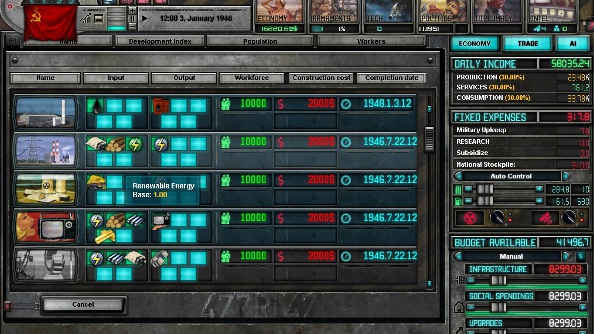
But even here, Paradox seem to be ahead of the potential problems. In just a few months the game has gone from looking like a fairly rough mod to a fairly polished strategy game, with a lot more on offer than just the United States vs. the USSR. Instead of focusing on the usual “Warsaw Pact invades Germany!” World War III scenario, we saw the early stages of the Arab-Israeli war in 1948, as the newborn Jewish state established itself in a battle with its Arab neighbors and demanded recognition from the world’s great powers. More importantly, I saw a lot of encouraging signs about how East vs. West will integrate small regional wars, complex internal politics, and a tense and dangerous global environment into an appealing whole.
The most interesting thing I learned about East vs. West is that every action occurs in the context of major international tension. Everything you do has to take that into account: if you want to expand your armed forces to include a few more modern armored divisions, your rivals may read that as escalation. Eventually everyone adjusts to the new status quo, but those moments of transition always have the potential to ignite the powder keg.
On the other hand, you can fight fairly aggressive wars provided you just frame them correctly. The classic example is the United States’ involvement in Vietnam. Once the South Vietnamese government is teetering under pressure from the Communist north, the Americans can ride to the rescue under the guise of a defensive war. Within the confines of South Vietnam, they can operate with a free hand, but expanding the war rapidly sends relations with the USSR and China tumbling.
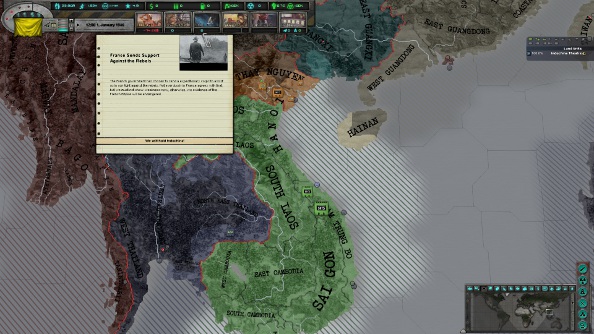
It’s important to pick your battles, because every country has a National Unity score and a Dissent score. The more strain a country is under, be it economic, military, or political, the more the government begins to fray. For a country like the US that could mean bad election results and new policies that will derail the player’s objectives. For a one-party dictatorship like the Soviet Union, the shattering of unity and growth of dissent could trigger waves of revolts.
East vs. West is never going to be a mainstream strategy game. The setting is a hard sell to players like me, who are addicted to the intimate chaos of Crusader Kings 2 and Europa Universalis. I’m also still not sure whether demographics are ever as good an idea in a strategy game as they seem. East vs. West’s emphasis on age cohorts and their political preferences could be the classically dangerous combination of obscurity and poor feedback. But it doesn’t look like an afterthought or a mod anymore. It is doing something distinctive from Hearts of Iron, and it seems to be doing it well.
On the other hand
I will admit I found myself missing the Paradox of two years ago. While I was fairly confident in most of the games I saw, I also didn’t see the kind of crazy ambition and originality that was on display in New York in 2011. Paradox released a lot of garbage in the last couple years, like Gettysburg: Armoured Warfare and Sword of the Stars 2, but there was also something admirable about their willingness to gamble on cool ideas from unlikely sources. While PC gamers often ended up as unwilling guinea pigs for these experiments, we also ended up with some great games like Mount & Blade. I wonder if this more sensible, responsible Paradox is still capable of finding projects like that.
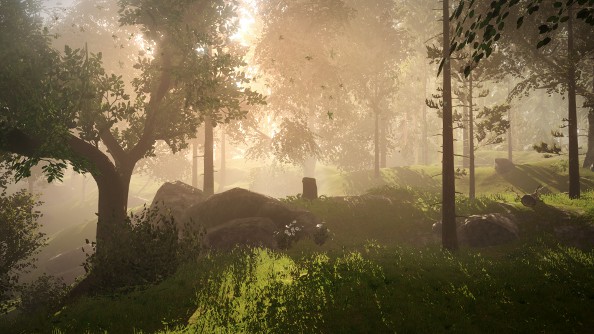
For instance, War of the Roses looks poised to grow and improve quite a bit this year, but I can never shake the feeling it thinks small. It is becoming more of a medieval Battlefield, complete with a Rush-style game mode, but it lacks the accidental grandeur or Mount and Blade. It has the art and style of a great medieval combat game, but the scale of a shooter deathmatch. While the Brian Blessed DLC coming out this year should be good for a laugh (his narration of a deathmatch sounds priceless), I’m not certain that War of the Roses is the best of both worlds so much as an awkward combination.
The Showdown Effect seems a bit more appealing. From the makers of Magicka, it is an homage to Super Smash Bros. and “Metroidvanias” games, done in the style of bad 1980’s action movies. In chaotic and fast-moving deathmatches, players race characters like an elderly kung-fu master or a cop “one day away from retirement” through a long platformer map, attacking other characters with guns and blades.
It’s frenetic and fun, but so frenetic that it began to feel a bit random. Combat quickly became about surviving long enough to deliver a couple melee strikes, which are almost always one or two-hit kills. It’s 1980’s trapping don’t come through particularly well in multiplayer, either. Like Magicka, it is a straightforward game powered by chaos and momentum, and how you feel about it will likely be determined by how much you enjoy frantic and almost arbitrary combat.
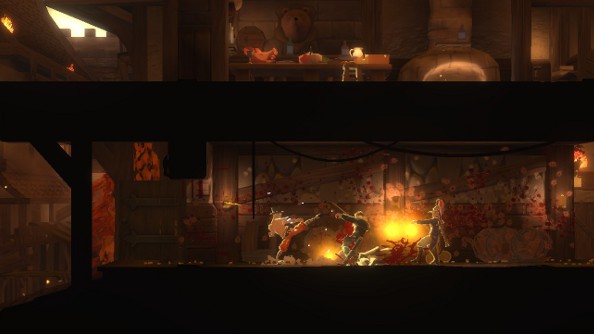
What I found myself missing from the latest Paradox Con was the long-shot underdog. That’s entirely self-serving, I admit: I don’t actually want broken games no matter how indie the developer and how big the dream. But I liked the idea of these games, and the story behind them.
Paradox looks to release a much stronger, polished lineup than at any point in its history. There is no doubt we’ll get more good games from them than in the past. But I hope this smarter, more careful Paradox remembers that it wasn’t bold ideas that got them in trouble, but poor follow-through. In short, I’m all for a New Paradox, provided it still remembers how to be weird.
